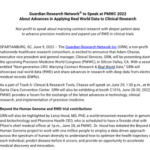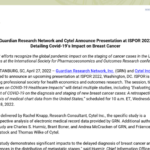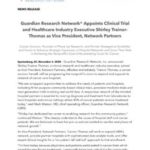
Guardian Research Network Celebrates Debut of New Early Cancer Detection Test
Guardian Research Network and its clinical trial partners and patients participated in the development of first-of-kind multi-cancer early detection (MCED) blood test
New MCED test will supplement recommended cancer screening tests to enable earlier, more effective treatment
SPARTANBURG, SC, JUNE 4, 2021 – Guardian Research Network (GRN) today recognized the debut of a groundbreaking multi-cancer early detection (MCED) test called Galleri™. Able to detect more than 50 types of cancers through a simple blood draw, Galleri is intended to complement U.S. guideline-recommended cancer screenings.
“GRN and our partners are gratified to be a major contributor to GRAIL’s landmark Circulating Cell-free Genome Atlas (CCGA) study that will help improve lives through early detection,” said Mark L. Watson, M.D., Ph.D., chief operating officer at Guardian Research Network. “We’re pleased to work with companies such as GRAIL to support breakthrough products and thank our patients who participated through GRN’s nationwide partnership of community hospitals. As a group, community hospitals provide 85 percent of both cancer and primary care, so cancer screening such as Galleri which is reliable and evidence-based is an important advancement—particularly in community hospitals where ease-of-use and cost-effectiveness are critical.”
GRN’s involvement in CCGA included identifying nearly 20 percent of patients for enrollment from just seven percent of the study’s active trial sites. To speed clinical development, GRN translates data into cures by harmonizing widely diverse patient data to accelerate next generation clinical trials for life threatening diseases, such as cancer.
Today, the majority of cancers are found too late when outcomes are often deadly. The ability to detect cancer early is critical, as cancer is expected to become the leading cause of death in the U.S. this year. Recommended screening tests save lives, but only cover five cancer types and screen for a single cancer at a time. In fact, cancers responsible for 71 percent of cancer deaths have no recommended early detection screening.
Galleri detects DNA that tumors shed into the bloodstream. In the CCGA study, Galleri demonstrated the ability to detect more than 50 types of cancers—over 45 of which lack screening tests—with a low false positive rate of less than 1 percent. When a cancer signal is detected, Galleri is able to identify where in the body the cancer is located with high accuracy, a critical component to help enable healthcare providers to direct diagnostic next steps and care.
- Liu MC, Oxnard GR, Klein EA, Swanton C, Seiden MV, Liu MC, Oxnard GR, Klein EA, Smith D, Richards D, Yeatman TJ. Sensitive and specific multi-cancer detection and localization using methylation signatures in cell-free DNA. Ann Oncol. 2020;31(6):745-59.
- Among individuals 50–79 years old.
Data on file from Surveillance, Epidemiology, and End Results (SEER) 18 Regs Research Data, Nov 2017 Submission. Includes persons aged 50-79. Estimated deaths per year in 2020 from American Cancer Society Cancer Facts and Figures 2020. Available at: www.cancer.org/content/dam/cancer-org/research/cancer-facts-and-statistics/annual-cancer-facts-and-figures/2020/cancer-facts-and-figures-2020.pdf
“We are grateful to Guardian Research Network for its dedication to advancing new technologies for early cancer detection, and for playing a pivotal role in the development of Galleri,” said Dr. Josh Ofman, chief medical officer and head of external affairs at GRAIL.“A simple blood test capable of detecting more than 50 cancers is a ground-breaking advancement, and could have a tremendous human and economic benefit.”
About Guardian Research Network (GRN)
A nationwide hospital consortium, Guardian Research Network is focused on accelerating cures by bringing clinical trials to under-served communities. Through our secure HIPAA-compliant data warehouse and advanced analytics tools, GRN speeds patient identification and enrollment, optimizes therapeutic and diagnostic studies, and expands the understanding of real-world data trends. GRN’s experienced clinical and technology team provides healthcare networks and life sciences clients with deep, real-world data insights from millions of patient records. For more on this 501(c)(3) nonprofit headquartered in Spartanburg, South Carolina, visit www.guardianresearch.org.
About Galleri
The earlier that cancer is detected, the better the chance of successful outcomes and survival. The Galleri™ multi-cancer early detection test can detect cancer signals across more than 50 types of cancer through a routine blood draw. When a cancer signal is detected, the Galleri test predicts the cancer signal origin with high accuracy to help guide the next steps to diagnosis. The Galleri test should be used in addition to recommended cancer screenings such as mammography, colonoscopy, PSA or cervical cancer screening. It is recommended for adults with an elevated risk of cancer, such as those aged 50 or older. Galleri is available by prescription only. For more information on Galleri, visit www.galleri.com.
About GRAIL
GRAIL is a healthcare company whose mission is to detect cancer early, when it can be cured. GRAIL is focused on saving lives and improving health by pioneering new technologies for early cancer detection. The company is using the power of next-generation sequencing, population-scale clinical studies, and state-of-the-art computer science and data science to overcome one of medicine’s greatest challenges with Galleri™, GRAIL’s multi-cancer early detection blood test. With this proprietary technology, GRAIL is also developing solutions to help accelerate cancer diagnoses, blood-based detection for minimal residual disease, and other post-diagnostic applications. GRAIL is headquartered in Menlo Park, California, with locations in Washington, D.C., North Carolina, and the United Kingdom. It is supported by leading global investors and pharmaceutical, technology, and healthcare companies.
Galleri Safety Information
Galleri test is recommended for use in adults with an elevated risk for cancer, such as those aged 50 or older. The Galleri test does not detect all cancers and should be used in addition to routine cancer screening tests recommended by a healthcare provider. Galleri is intended to detect cancer signals and predict where in the body the cancer signal is located.
Results should be interpreted by a healthcare provider in the context of medical history, clinical signs, and symptoms. A test result of “Cancer Signal Not Detected” does not rule out cancer. A test result of “Cancer Signal Detected” requires confirmatory diagnostic evaluation by medically established procedures (e.g., imaging) to confirm cancer.
If cancer is not confirmed with further testing, it could mean that cancer is not present or testing was insufficient to detect cancer, including due to the cancer being located in a different part of the body. False-positive (a cancer signal detected when cancer is not present) and false-negative (a cancer signal not detected when cancer is present) test results do occur. Galleri is prescription only.
GRN Media Contact
Charlene Smith-McCaw, MBA
Guardian Research Network
610-888-09024
csmithmccaw@guardianresearch.org
© 2024 Guardian Research Network- All Rights Reserved| Legal





